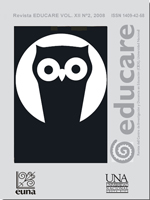La diversidad en los procesos educativos: bases para una propuesta conceptual
DOI:
https://doi.org/10.15359/ree.12-2.9Keywords:
diversity, exclusion, inclusion, curriculum for diversity, pedagogy for diversityAbstract
The main thesis of this work is that what makes problematic the diversity concept approach are the consequences that we derive from its recognition. And this recognition comes from pedagogy. After examining, briefly, the importance of the idea of diversity in the main traditions of the social philosophy, the author proposes the conceptual bases that, from these ideological readings must direct the pedagogical boarding of the concept.
References
Belmonte, M. (1998). Atención a la Diversidad. Diseño de estrategias y evaluación formativa
basada en el análisis de tareas. Tomo I. Bilbao: Ediciones Mensajero.
De Lucas, J. (2003). Globalización e identidades. Claves políticas y jurídicas. Barcelona: Icaria
Editorial.
Devalle, A. y Vega, V. (1999). Una escuela en y para la diversidad. El entramado de la diversidad.
Buenos Aires: AIQUE.
Giroux, H. (2001). Cultura, política y práctica educativa. Barcelona: Graó.
Hernández, D. (2005). El concepto de diversidad en los procesos educativos presente en el Plan
de estudios y en los programas de curso de la Maestría en Pedagogía con énfasis en
diversidad en los procesos educativos de la Universidad Nacional. Trabajo final para los
cursos Didáctica para la construcción del conocimiento y Análisis pedagógico de la
diversidad. Maestría en Pedagogía con énfasis en diversidad en los procesos educativos.
Heredia, Costa Rica: Universidad Nacional.
Hernández, O., Ibarra, E. y Quesada, J. R. (1993). Discriminación y racismo en la historia
costarricense. San José: Editorial de la Universidad de Costa Rica.
McLaren, P. (1997). Pedagogía crítica y cultura depredadora. Políticas de oposición en la era
posmoderna. Barcelona: Ediciones Paidós.
Sacristán, J. G. (2002). Educar y convivir en la cultura global. Madrid: Editorial Morata.
Savater, F. (2002). El valor de educar. Barcelona: Ariel.
Downloads
Published
How to Cite
Issue
Section
License
1. In case the submitted paper is accepted for publication, the author(s) FREELY, COSTLESS, EXCLUSIVELY AND FOR AN INDEFINITE TERM transfer copyrights and patrimonial rights to Universidad Nacional (UNA, Costa Rica). For more details check the Originality Statement and Copyright Transfer Agreement
2. REUTILIZATION RIGHTS: UNA authorizes authors to use, for any purpose (among them selfarchiving or autoarchiving) and to publish in the Internet in any electronic site, the paper´'s final version, both approved and published (post print), as long as it is done with a non commercial purpose, does not generate derivates without previous consentment and recognizes both publisher's name and authorship.
3. The submission and possible publication of the paper in the Educare Electronic Journal is ruled by the Journal’s editorial policies, the institutional rules of Universidad Nacional and the laws of the Republic of Costa Rica. Additionally, any possible difference of opinion or future dispute shall be settled in accordance with the mechanisms of Alternative Dispute Resolution and the Costa Rican Jurisdiction.
4. In all cases, it is understood that the opinions issued are those of the authors and do not necessarily reflect the position and opinion of Educare, CIDE or Universidad Nacional, Costa Rica. It is also understood that, in the exercise of academic freedom, the authors have carried out a rogorous scientific-academic process of research, reflection and argumentation thar lays within the thematic scope of interest of the Journal.
5. The papers published by Educare Electronic Journal use a Creative Commons License:














 The articles published by Educare Electronic Journal can be shared with a Creative Commons License:
The articles published by Educare Electronic Journal can be shared with a Creative Commons License: 



